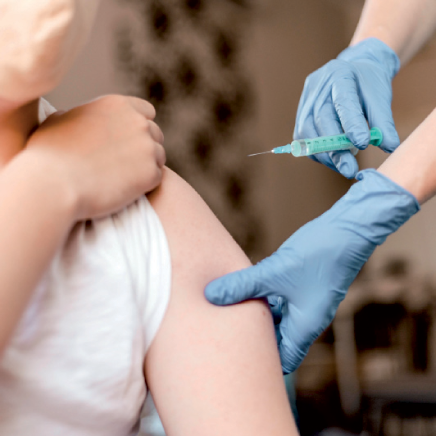You are here
Gaps in vaccination coverage lead to rise in measles cases — health minister
By Rayya Al Muheisen - Oct 02,2023 - Last updated at Oct 02,2023

Health Minister Feras Hawari and officials during a press conference in Amman on Monday (Petra photo)
AMMAN — Health Minister Feras Hawari on Monday highlighted significant factors contributing to the spread of measles, including the surge of refugees from multiple countries and a decrease in vaccination coverage.
Hawari’s remarks came during a press conference at the Ministry of Health to discuss the national vaccination campaign and address measles concerns in the national vaccination campaign.
The minister emphasised that one of the primary reasons for the outbreak was gaps in vaccination coverage.
Since April through June of this year, 163 people in Jordan have contracted measles, said Hawari.
He reassured the public that despite the recent outbreak, the current spread of measles in Jordan is minimal, citing prior vaccination campaigns, such as the National Vaccination Programme, as “a testament to Jordan's proactive approach”.
Hawari emphasised the scientific basis of their plan, citing successful implementation in countries where measles had spread. The Ministry of Health's response has been swift, focusing on identifying infected individuals and their close contacts, targeting a group of approximately 120,000 people to control the outbreak.
Measles transmission, Hawari stated, can be attributed to several factors, including gaps in vaccination and vaccine hesitancy. The COVID-19 pandemic exacerbated these challenges, leading to a drop in vaccination rates from the recommended 95 per cent to around 77 per cent.
Nevertheless, Jordan has improved its vaccination rate to approximately 91 per cent and is aiming for 95 per cent, he added.
Hawari underscored the seriousness of measles, especially among children, given its highly contagious nature. He explained that the vaccination campaign relies on a safe and effective vaccine approved by Jordan Food and Drug Administration (JFDA), emphasising the absence of risks for children based on previous vaccination experiences.
To maintain trust in the national vaccination programme, Hawari urged the public to dispel rumours and misinformation. Parents are given the choice to consent or refuse vaccinations for their children, with the government prioritising the well-being of students.
The national vaccination campaign continues, with the vaccine expected to arrive by the end of October. Before distribution, the vaccine will undergo a thorough process overseen by the JFDA to ensure its safety, he said.
Meanwhile, Mohammed Yahya, the President of the National Centre for Epidemics and Communicable Diseases, pointed to a declining trend in the epidemiological curve of measles cases, with only two cases recorded in recent weeks despite the surge in April. Results from scientific research conducted in collaboration with the Ministry of Health have affirmed the vaccine's safety, the official said.
Hawari reaffirmed the ministry's commitment to eradicating measles in Jordan through the new vaccination programme, initiated in response to the appearance of measles cases in April.
Related Articles
AMMAN — Due to the COVID-19 pandemic, vaccination coverage in Jordan has witnessed a decrease, according to the Health Ministry.Vaccination
AMMAN — The Measles-Rubella (MR) vaccine, which is provided free of charge for targeted children in Jordan, is safe and effective at protect
GENEVA —The World Health Organisation(WHO) warned on Thursday that Covid-19 restrictions had crippled measles vaccination efforts amid fears



















